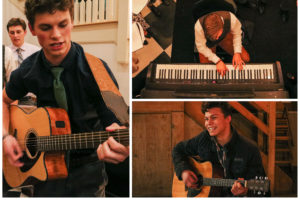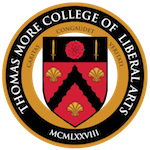by Bridget Ruffing, ’22
When he is not teaching Latin to the Freshmen, working on his doctoral dissertation, or spending time with his family at their New England home, Fred Fraser, a Fellow of the College, can be found directing the Saint John Ogilvie Folk Music Guild. This Guild has had an enthusiastic and loyal following of Thomas More students since its inception. In the fall of 2013, Mr. Fraser assumed leadership of the Folk Music Guild. In this role, he encourages students to master a range of traditional folk songs and cultivate patience, discipline, and an appreciation for the folk music tradition, which has roots in Scottish and English culture and has produced its own living offshoot in America.
The Saint John Ogilvie Folk Music Guild is such a fixture in the Thomas More College community that, in the fall of 2018, Phil and Leila Lawler—long-time friends of the College—established the Ogilvie Scholarship. Each year, the College awards this scholarship to an incoming freshman who demonstrates sufficient talent and willingness to contribute to Thomas More’s folk music tradition. To apply for this scholarship, the student must state in a one-to-two-page essay how he or she is qualified to receive this award. Mr. Fraser joins forces with the admissions team to review the essays, and the winner receives an annual stipend of $1,000 for each of his or her four years at the College. Recipients of this scholarship so far have been Benjamin Wassell ’23, Elias Wassell ’24, and Alexander Tapsak ’25. The granting of this award is conditional upon the recipient’s willingness to lead or contribute to folk music sessions on campus.

Mr. Fraser was kind enough to take time out of his busy schedule to answer some questions about his work with the Folk Music Guild.
What are your views on the importance of keeping the folk tradition alive?
The folk song tradition contains many expressions of strong attitudes of soul (whether towards work or a difficult situation) and of a deep (totally healthy and normal) need for others. These internal dispositions are what people, centuries before, have learned and achieved through experience and suffering. In song, we imitate their dispositions. Although we are undergoing experiences of our own now, they differ from those of our ancestors only by time and circumstance. I encourage students to seek advancement in the Guild, since this is a way for them to make the Guild material more their own. The songs—once memorized—may go with a student after graduation, and they are serviceable at home, at work, or during leisure hours. The songs and the reason for singing them are deserving of one’s time and thought. To become an apprentice, one must demonstrate that one has devoted time to becoming a scholar of both the music and of what the music represents.
Does being a member of the Folk Music Guild help form one into a better student? In what ways?
My most straightforward answer is that I hope so. Music does have a formative role in a person’s life, good music in a good way, and bad music in a bad way. One of the goals of the Guild is to help students develop musical tastes that coincide with the educational mission of the College. Many of the Guild songs express noble sentiments which resonate with themes taught in the humanities courses, such as love of another person, love of home, and love of work. These noble affections characterize songs such as Believe Me If All Those Endearing Young Charms, Long Long Ago, Sewanee River, and the Mingulay Boat Song. These same feelings are also rooted in literature in books such as The Odyssey, The Georgics, and Brideshead Revisited, to name a few.
Why is it beneficial for someone to participate in and rise in the ranks of the Folk Music Guild?
I remind the Guild members of the antiquity of the art of singing in common. To support my point, I read to them the following passage from Polybius, in which the historian describes the role of music in Arcadia (one of the regions whence Greek civilization arose):
We should not think that the ancient Cretans and Lacedaemonians to no purpose introduced the flute and the measured tread, instead of the bugle into war, or that the early Arcadians to no purpose filled their whole public life with music, to such an extent that not only boys but even young men up to the age of thirty had to study it constantly, although otherwise their lives were most austere. For everybody knows that only in Arcadia, first, the boys from earliest childhood are trained to sing in measure the hymns and paeans in which the people of each place, by tradition, hymn their local heroes and gods . . . And through their whole lives, in social gatherings they entertain themselves not with hired performers but by themselves, calling for song from each in turn. And though they are not ashamed to deny acquaintance with other studies, song they can neither deny knowing, since all are compelled to learn it, nor, since they admit that they know it, can they excuse themselves; for among them this is thought shameful. Besides this, the young men practice marching tunes with the flute and in formation, and perfect themselves in dances, and each year perform in the theaters for their fellow citizens, all at the public expense . . . (the ancients) also accustomed both men and women alike to frequent festivals, and sacrifices, and dances of men and women, and used every possible device to mollify, by such customs, the extreme hardness of the natural character. The Cynaetheans neglected these institutions, though in special need of them, as their country and climate is the most rugged in Arcadia; and by devoting themselves to their mutual frictions and animosities, finally became so savage that in no city of Greece were greater and more constant crimes committed (Book IV, chapter 20).
When Polybius says that the ancient Greeks used festivals, sacrifices, and dances to mollify the natural character, he is referring to what we today call the “humanizing” effect of good literature and education. As a college, Thomas More College pursues this goal, too, and the Folk Music Guild contributes to this part of the mission.
For further reading:
Painting, Poems, and Pageants: Guildmaster John Folley and the Sacred Art Guild
